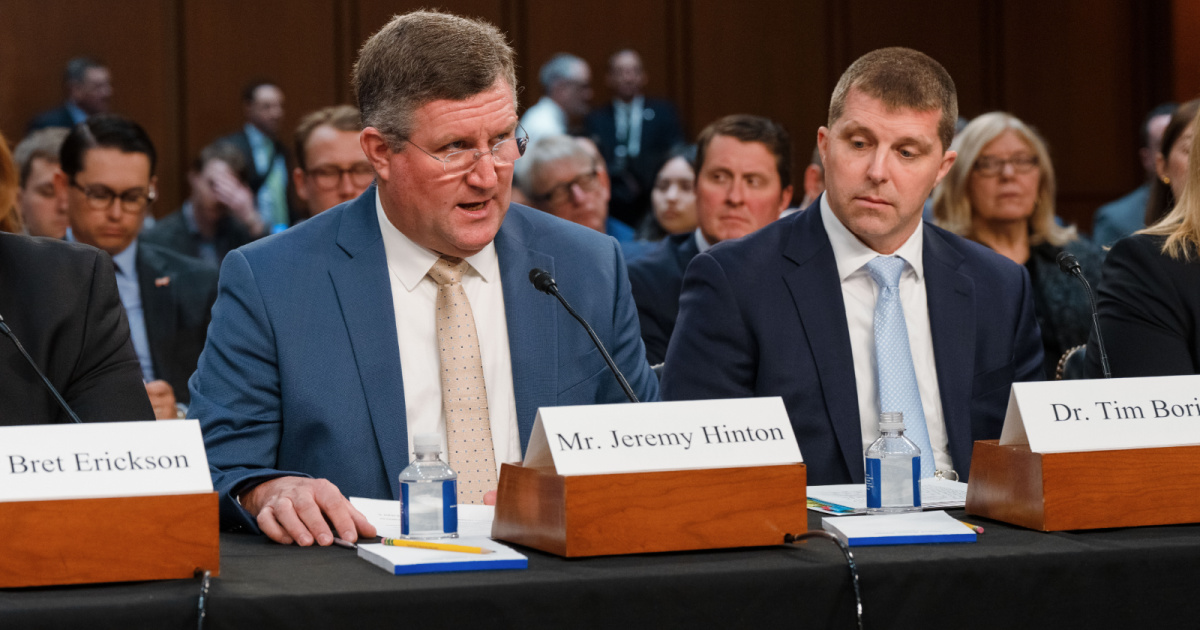Being Heard on the Hill
Posted on Apr 3, 2025
LaRue County Farm Bureau President Jeremy Hinton testifies in front of U.S. Senate Ag Committee.
While Kentucky Farm Bureau brings large numbers of members to the nation’s capital every year to hear from and speak with the state’s congressional delegation, having the honor of testifying before a committee of the U.S. Congress brings an unprecedented opportunity to advocate on behalf of local farm families.
LaRue County President Jeremy Hinton did just that recently as he appeared before the U.S. Senate Committee on Agriculture, Nutrition, and Forestry. Hinton. He appeared with other state and national agricultural leaders to discuss issues related to specialty crop growers.
Hinton, who also serves as Chair of the Kentucky Horticulture Council, owns two farm markets as part of his overall farming operation, which includes traditional crops such as soybeans and tobacco.
He was one of five agriculture leaders from various states who provided the committee with an array of specialty crop information and concerns during a February 26 hearing.
“As part of the eighth generation of my family to farm in LaRue County, my connection to agriculture began at the time that (Abraham) Lincoln wandered the fields around Sinking Springs and Knob Creek and continues today,” he said. “While my farm may look different from my grandfather’s registered Hereford cattle farm, it also looks different than hundreds of others across the country that would be classified as ‘specialty crop’ growers.”
Hinton explained that specialty crops come in many shapes and sizes, and while individually smaller in acreage when compared to other commodities like corn or cotton, the collective impact of these high value crops cannot be overlooked as part of the greater agriculture industry.
“Farmers of all kinds share many of the same challenges and concerns, but others are unique to operations like mine,” he told legislative members. “In addition to our farming operations, I am also a crop insurance agent, and while most traditional row crop acres are covered under federal crop insurance programs, participation for specialty crop growers continues to be much lower.”
Hinton explained that multiple factors contribute to this such as, in many areas, a lack of available coverage.
“While availability of policies for specialty crops is increasing, the geographic disbursement of specialty crop acres often makes it difficult for actuaries to rate products for limited acres, meaning agents and growers must meet additional requirements to ensure crops under written agreements approved by RMA [Risk Management Agency],” he said.
Another reason, cited by Hinton, is a lack of education. While efforts are being made by organizations like the Kentucky Horticulture Council to increase awareness and understanding of the options available for specialty crops, growers in large part still do not understand how they can work for their operation.
“It is my hope that in a new Farm Bill and as negotiations open for changes in the crop insurance program, we can address issues that will strengthen insurance options for specialty crop growers,” he said.
In addition to crop insurance concerns and a need for more education, Hinton also noted the “blessing” for continued use of consistent H-2A workers.
“For many specialty crop growers, availability and cost of labor continues to be among our greatest challenges,” he said. “Lack of available local labor led us to the H-2A program nearly 10 years ago. We are blessed with returning workers who are critical to the survival of our business, but as the cost of that labor continues to increase, we must either find additional efficiencies to reduce costs, respond with increases in our prices to our customers, or reduce already slim profit margins.
Hinton encouraged members of the committee to continue dialogue with those on the farm for meaningful reform to the H-2A and other temporary worker visa programs to support all segments of agriculture.
“It is critical to the stability of our food supply,” he said.
Hinton also discussed the issue of farmland transition and the decline in farmed acreage in Kentucky.
“Loss of farmland to development is a key issue in the state of Kentucky, as well as across the nation,” he said. “According to the 2022 Census of Agriculture, Kentucky lost more than 546,000 acres of farmland from 2017 to 2022, meaning we are losing more than 290 acres per day in the commonwealth. For context, the average farm size in Kentucky is 179 acres. As we in agriculture look to the future and a growing population, this issue is one that must be addressed.”
Hinton told committee members of the KFB Farmland Transition Initiative and the efforts being made in this state to combat those farmland losses.
“Kentucky Farm Bureau is working with stakeholders at both the state and federal levels to address this key issue through education, providing resources and networking, and through policy recommendations,” he said. “I look forward to your involvement in helping with solutions to this important issue. While on one hand, new neighbors mean new customers for our retail markets, we must find a balance between well planned development and farmland preservation to ensure the future of our farms and rural communities.”
KFB President Eddie Melton said having local Farm Bureau members who are willing to advocate for the agriculture industry at all levels is critical to the success of the organization.
“For more than a century, Farm Bureau has relied on its local leaders to stand up and speak out on issues affecting their family farms and the communities in which they live, from the steps of their courthouses to the halls of Congress,” he said. “Jeremy is a great example of how effective we can be as an organization when our county members are willing to testify in front of congressional leaders from across the country to tell their stories, discuss their challenges, and offer their input on solutions that will ultimately benefit us all.”
Comments